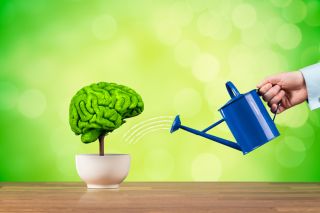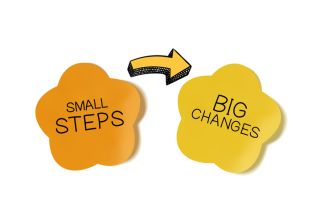Executive Function
ADHD and Stronger Executive Functioning Skills
7 tips for improvements without medication.
Updated July 1, 2023 Reviewed by Tyler Woods
Key points
- Executive functioning skills describe the directive capacities of the brain.
- People with ADHD typically have more significant and numerous executive functioning challenges than others.
- While medication for ADHD can be an important part of treatment, pills don't teach skills.
- Improving executive functioning skills takes practice and patience so pick one skill to address at a time.

Every human being lives with executive functioning strengths and challenges. These executive functioning skills—the domain of our prefrontal cortex—help us connect, prioritize and integrate cognitive functions moment by moment. Executive functioning skills describe the directive capacities of the brain, the conductors for the orchestra of thoughts, feelings, and actions that help people function daily and make them who they are. People with ADHD, though, have more severe, significant, and often numerous executive functioning challenges than neurotypical folks. In fact, the more severe somebody's executive functioning challenges are, the higher the likelihood there is of a co-occurring learning disability.
Executive functioning skills work as a command center: connecting, prioritizing, and integrating cognitive functions moment by moment. They are responsible for self-regulation, linking memory to what we see and think about right now, self-awareness, and judgment along with actions related to productivity and performance. While medication for ADHD can be an important part of treatment, pills don't teach skills. Folks with ADHD benefit from learning strategies and techniques for understanding and managing their executive functioning issues effectively. New routines with interventions directed at building new habits can seem appealing but daunting. It can be tough to know where to start and what to do.
Typically, it's helpful to begin the process of building executive functioning skills by examining the biggest and most difficult issues you face on a daily basis. These primary areas of concern usually reflect the aspects of life that are persistently tough, embarrassing, and frustrating. Sometimes it can be confusing to sort through things on your own and, instead of gaining clarity, people become overwhelmed and discouraged. Start with some self-reflection by considering these questions:
- What are the performance or productivity issues that challenge you the most?
- How well can you manage your emotional reactivity or impulse control?
- How easily are you distracted from the task at hand?
- What helps you maintain focus and stick with goals?
- Do you find that you become overwhelmed and shut down more than you would like?
Once you have considered these questions, ask yourself: If I had a magic wand and could change one thing about myself, what would it be? Take into account all of your responses and choose one skill that you would like to improve first. Instead of setting unreasonable expectations about your goals and your progress, try to create small goals with small steps. We are looking for the building blocks of progress so that you will feel encouraged to keep going.
Here are seven tools you can use to start the process of change:
1. Inhibition and Emotional Control: Slow things down. It takes just a few seconds to go from being triggered to becoming activated, impulsive, and overwhelming to others. Take a pause before responding to anything so you can reflect and offer a more thoughtful response. Instead of being surprised or angry at yourself when you react more quickly than you would like, expect that these responses are part of what it means to have ADHD. Create a plan in advance for recovering from these moments and making amends.
2. Initiation: Break things down into smaller components. Use Apps to assist you by signaling when to start and when to pause. Look at whether perfectionism is interfering with your ability to begin: Do you believe that you won't get something done well enough so you give up beforehand? Decrease your avoidance by starting with something easy to get rolling.
3. Organization: Improve your organization by recognizing that each of your things needs a place to live. Whether it's a file, a box, or a drawer, consider what can be grouped together. When you make specific spaces for storing materials or items, it's easier to deal with them. Maybe your keys, your wallet, or your purse go into a basket on the kitchen counter where you can find them quickly the next day. Maybe you want to organize your clothes by color or function in your closet. Reflect on what systems of organization make sense to your brain. Then you can create daily routines to follow them.
4. Prioritizing: Sometimes it's tough to determine where to start on a project or a chore. You might make a to-do list but then get stuck deciding what the priorities are. When you make a large brain dump of all of the tasks, follow that with two smaller lists of things that are urgent (time-related issues) and those that are important (value or pleasure issues). Then break these lists down into an even smaller set of tasks—no more than three at a time.
5. Sustained attention: Consider possible obstacles to maintaining focus. Decide what tasks are easy, medium, or hard and what order you want to put them in. Create a plan for yourself to return to your work after you drift off. Try using an app such as Stay On Task to help redirect your attention and maintain your concentration.
6. Working memory: Writing things down helps with recall and reduces anxiety about forgetfulness. Take advantage of alarms, alerts, and notifications. Feel free to take notes during important meetings, classes, or conversations because writing helps encode information in your memory and you have something tangible to look at afterward. If note-taking is difficult for you, brainstorm solutions with your supervisor, professor, or partner that may include recording things or letting caring coworkers or friends assist you by taking notes (you may also ask for ADA accommodations).
7. Goal-directed persistence: Set realistic goals based on your actual capabilities, not what you think you should accomplish based on comparisons to others. Plan for your productivity rather than approaching work or projects randomly. If you are interrupted or take a break, leave yourself notes about what you were doing and thinking so you can ease back into your work more smoothly. Work in timed periods with timed breaks.

Developing self-awareness fosters all of these executive functioning skills. As your capacity to monitor yourself builds, you are better able to evaluate your progress, emotional regulation, and performance. Questions to start with: “How am I doing?” “What helped me before that I could apply to this situation?” “What is interfering with my concentration?” “How can I deal with this obstacle?” By increasing metacognition, you learn to strategize more effectively, get more accomplished, and feel positive about yourself too.
Improving executive functioning skills takes practice, patience, and determination. While medication can be very helpful, pills don’t teach skills. In fact, recent research out of Florida International University by William Pelham found that medication helped children complete more seat work, improved their classroom behavior, and reduced rates of getting in trouble. Another study by Pelham emphasized the importance of behavioral therapy to learn tools and strategies to succeed at home, work, school, and in social environments. Does this mean that people should stop taking medication? Absolutely not. But it does underscore the importance of learning executive functioning skills for effective daily living.
Remember, to avoid becoming overwhelmed or feeling discouraged, pick one skill to address first. Give yourself three months to work on this skill and build your changes into new habits. When you feel solid in your ability to sustain these new habits most of the time (remember, perfection is a myth), then choose another one to address. Practice kindness and self-compassion: shifting old routines and making the improvements you desire means that you will stumble along the way, recover, and try again. That's what having a growth mindset is all about.
References
Pelham, W. E. III, Altszuler, A. R., Merrill, B. M., Raiker, J. S., Macphee, F. L., Ramos, M., Gnagy, E. M., Greiner, A. R., Coles, E. K., Connor, C. M., Lonigan, C. J., Burger, L., Morrow, A. S., Zhao, X., Swanson, J. M., Waxmonsky, J. G., & Pelham, W. E., Jr. (2022). The effect of stimulant medication on the learning of academic curricula in children with ADHD: A randomized crossover study. Journal of Consulting and Clinical Psychology, 90(5), 367–380. https://doi.org/10.1037/ccp0000725; https://news.fiu.edu/2022/long-thought-to-be-the-key-to-academic-succes…
Pelham WE Jr, Fabiano GA, Waxmonsky JG, Greiner AR, Gnagy EM, Pelham WE 3rd, Coxe S, Verley J, Bhatia I, Hart K, Karch K, Konijnendijk E, Tresco K, Nahum-Shani I, Murphy SA. Treatment Sequencing for Childhood ADHD: A Multiple-Randomization Study of Adaptive Medication and Behavioral




